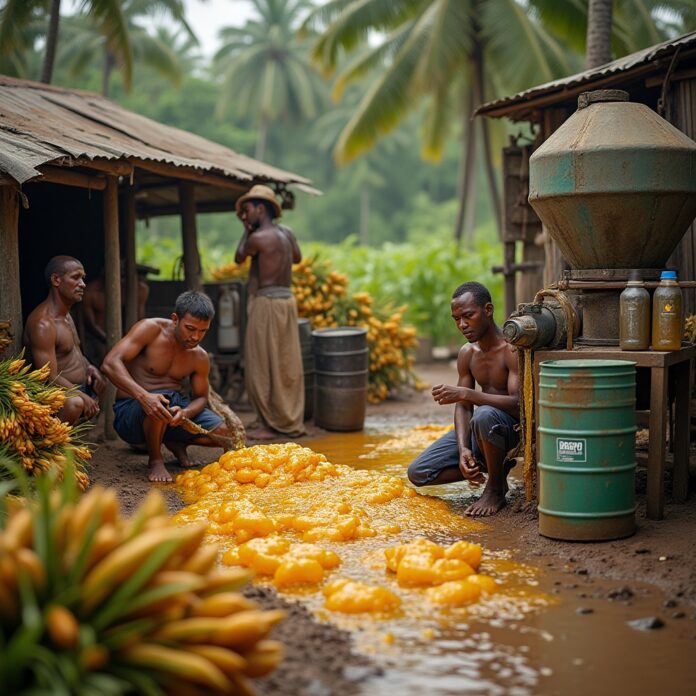Global demand for sustainable palm oil is surging, and small-scale producers hold a golden ticket. But scaling up while juggling tight budgets and buyer expectations isn’t easy. The solution? Efficiency. By refining processing techniques, optimizing packaging, and strategically targeting export markets, smallholders can transform their operations into profitable, globally competitive ventures. Let’s break down how.
🏗️ BuildNaija Expo 2025!
🗓️ May 30-31 | Online Event via Google Meet
Efficient Processing Techniques for Small-Scale Operations
Traditional vs. Modern Methods
Hand-pressing fruit is low-cost but labor-intensive, yielding only 10–15% oil. Small-scale mechanical presses, like mini digesters or screw presses, boost yields to 25–30% while cutting labor costs. For example, Ghanaian cooperatives using $3,000 screw presses reduced labor by 40% and increased output.
Critical Steps Simplified
- Sterilization: Steam fruit in repurposed metal drums (no fancy equipment needed).
- Digestion & Pressing: Mechanical digesters extract pulp efficiently.
- Clarification: Use mesh screens or centrifugal separators to remove impurities.
Quality Control
- FFA (Free Fatty Acid): Keep levels below 5% using $20 test kits.
- Moisture: Sun-dry kernels to <0.5% moisture before pressing.
Waste Management
- Convert POME (Palm Oil Mill Effluent) into biogas.
- Use palm kernel shells as boiler fuel.
Packaging Strategies for Market Readiness
Materials & Regulations
- Use food-grade HDPE drums (avoid PVC, banned in the EU).
- Comply with EU FCM regulations for European markets.
Labeling Essentials
- Include origin, production date, and certifications (e.g., RSPO, organic).
Preservation
- Add natural antioxidants like rosemary extract.
- Store in shaded, cool areas to prevent rancidity.
Cost-Saving Tips
- Use bulk drums (200L) for industrial buyers.
- Partner with local suppliers for retail-sized PET bottles.
Breaking into Export Markets
Target Markets
🏗️ BuildNaija Expo 2025!
🗓️ May 30-31 | Online Event via Google Meet
- Europe: Prioritize certified sustainable oil (RSPO, organic).
- Asia: Focus on affordability and ethical sourcing.
Certifications
- RSPO Smallholder: Costs ~$2,000; audit takes 6–8 months.
- EUDR Compliance: Requires GPS-mapped plantations (use free apps like Collect Earth).
Logistics
- Use FOB Incoterms to avoid hidden fees.
- Work with freight forwarders experienced in agricultural exports.
Financing
- RSPO’s Smallholder Support Fund: Grants up to $10,000.
- FAO’s SAFE Initiative: Loans at 5% interest.
Case Studies & Success Stories
Ghana’s “Golden Pod” Cooperative
- 20 farmers pooled resources, achieved RSPO certification, and now export 50 tons/month to Belgium. Profits rose 200% per farmer.
Indonesia’s Mobile Mill Revolution
- Truck-mounted mills process fruit on-site, achieving FFA levels <3%. They now supply a Singaporean biofuel startup.
Lessons Learned
- A cooperative skipped moisture testing; their oil molded in transit, costing $12,000.
Tools and Resources
Equipment Suppliers
🏗️ BuildNaija Expo 2025!
🗓️ May 30-31 | Online Event via Google Meet
- Krishidarshan (India): Mini mills (~$5,000; krishidarshan.in).
- Kew Technology (Nigeria): Portable screw presses (3,200–3,200–6,500; sales@kewtech.com).
Certification Bodies
- RSPO Smallholder Certification (rspo.org).
- Control Union (organic certification; controlunion.com).
Training Programs
- FAO E-Learning: Free courses on sustainable milling.
- RSPO Smallholder Academy: Workshops in Ghana, Indonesia, Colombia.
Market Data
TradeMap (trademap.org): Real-time palm oil pricing
🏗️ BuildNaija Expo 2025!
🗓️ May 30-31 | Online Event via Google Meet
Small-scale palm oil production thrives on efficiency, certifications, and collaboration. Key steps:
- Mechanize pressing to boost yields.
- Certify with RSPO to access premium markets.
- Partner with cooperatives to scale exports.
The global market needs sustainable suppliers—your hustle matters.




